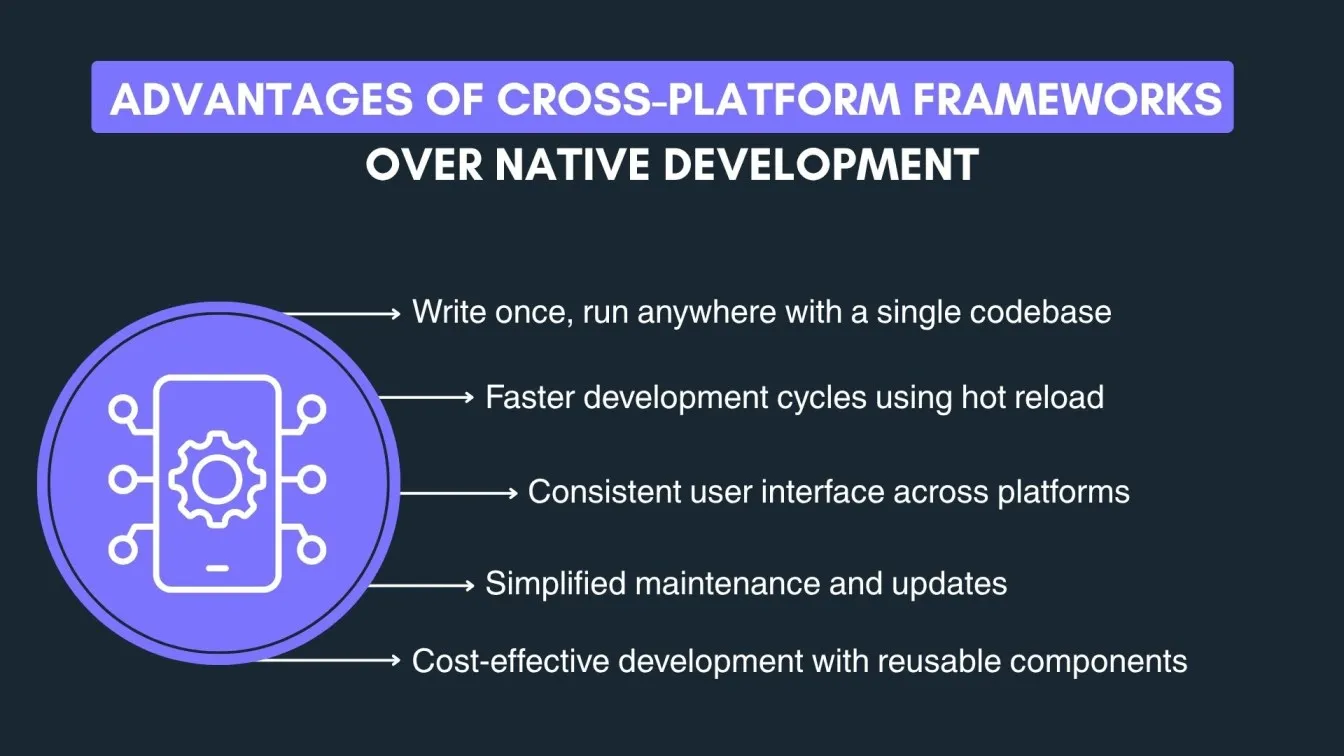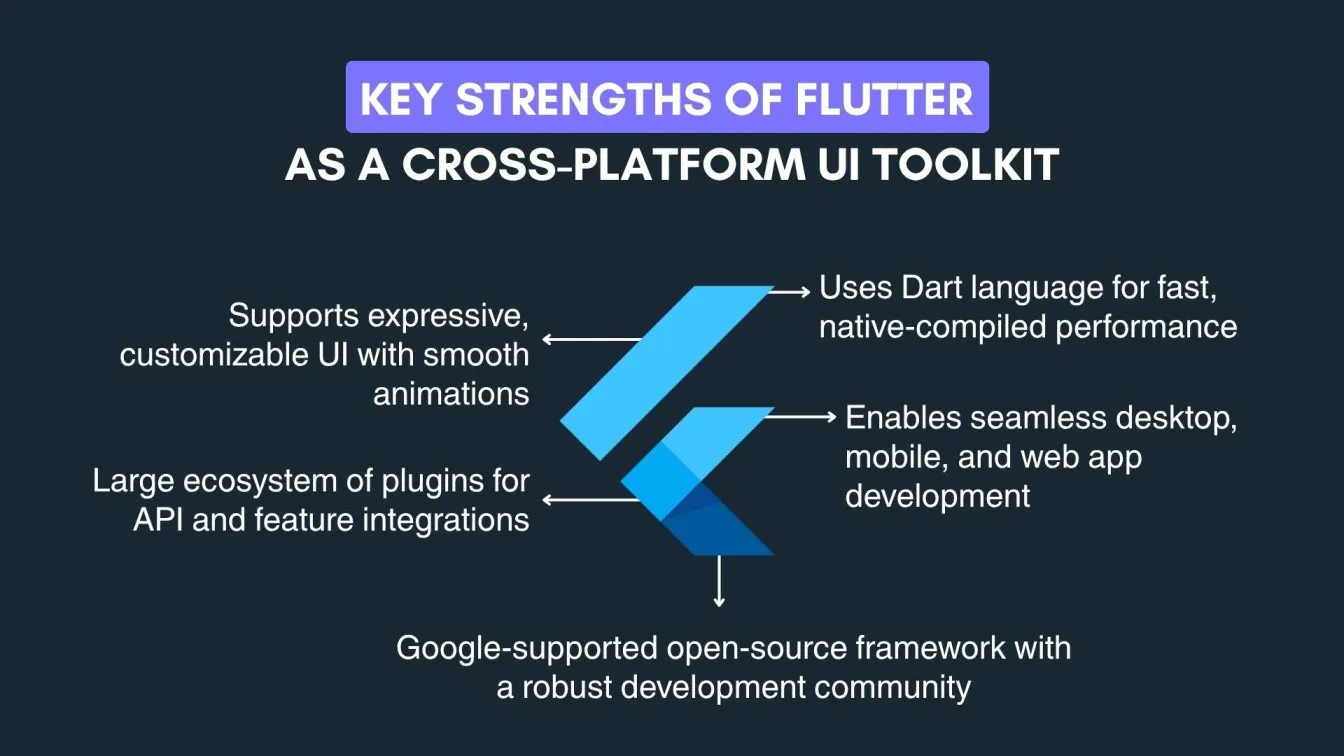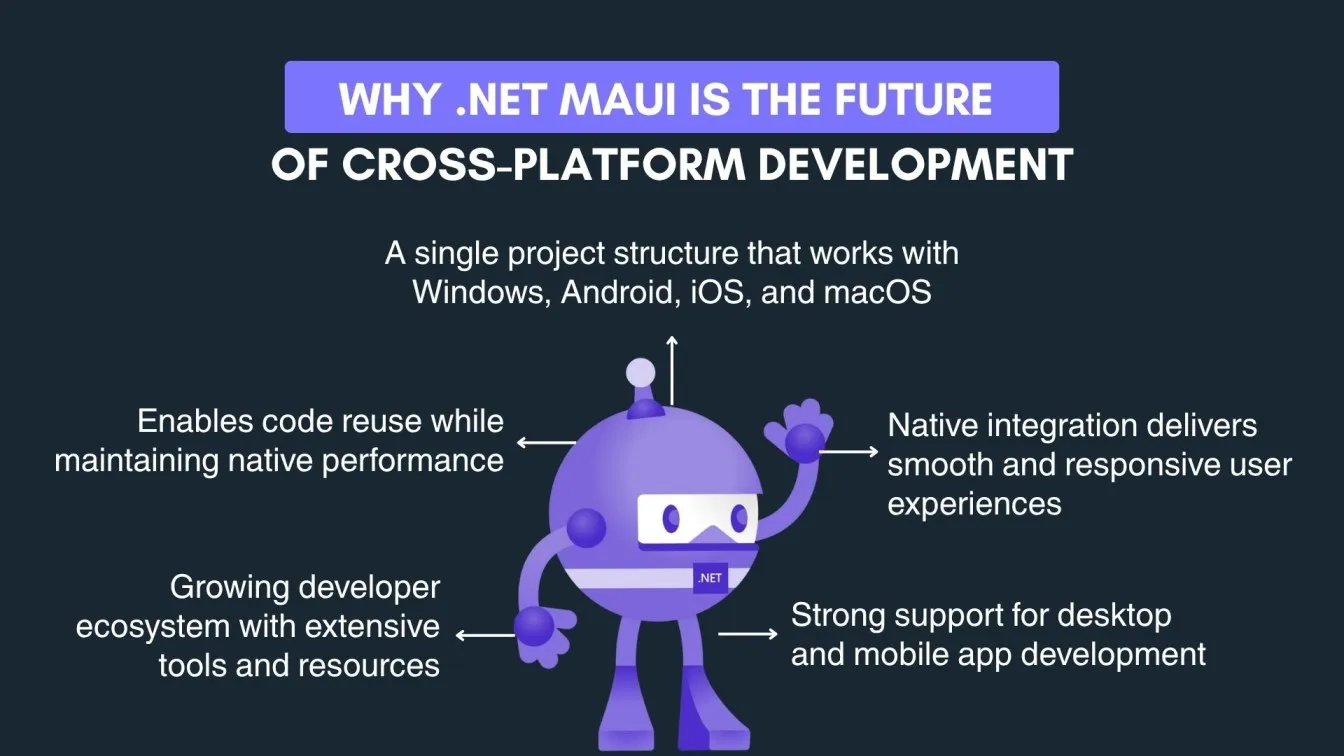Top Frameworks for Building Cross-Platform Apps in 2025
With the rising demand for seamless user experiences, faster development cycles, and wider device compatibility, selecting the right cross-platform app development framework has never been more important. Whether you’re creating business apps, IoT solutions, or feature-rich mobile applications, understanding the strengths of each framework helps you build efficient, scalable, and high-performance apps in 2025. Choosing the best cross platform app development approach or partnering with a reliable cross platform app development company can make all the difference in achieving success.
This in-depth guide covers everything you need to know about the top cross-platform frameworks from Flutter development and React Native to Xamarin, .NET MAUI, and Ionic. You’ll learn about their unique features, performance benefits, ecosystem support, and how they handle native integrations and UI design.
What’s inside? Keep reading for:
🚀 A summary of the top cross-platform frameworks for 2025
🚀 Key features that drive development efficiency and app performance
🚀 Key factors to consider for code reuse, native performance, and developer productivity
🚀 Best practices for choosing the ideal framework for your project needs
🚀 Future trends influencing the creation of cross-platform mobile apps
Introduction to Cross-Platform App Development in 2025
Cross-platform app development has become a vital approach in today’s fast-paced tech world. As businesses strive for broader reach and faster deployment, using a cross-platform framework allows developers to create cross-platform mobile apps with a single codebase that works across Android, iOS, Windows, and even web or desktop. In 2025, the emphasis is on native performance, code reuse, and seamless integration to enhance app scalability and performance.
With the rise of Xamarin app development services and growing debates around React vs React Native, companies are carefully choosing between frameworks that best fit their project needs. Leading react native app development services offer optimized solutions for iPhone app development and Android alike, delivering near-native experiences without compromising on speed or quality.
Why Choose Cross-Platform Frameworks Over Native Development?
- Enterprise cross-platform app development offers easier code reusability, reduced app development costs, and a quicker development time than native development.
- Unlike native apps that require platform-specific code, cross-platform solutions allow for component-based UI development, cleaner code, and greater developer productivity through hot reload and reusable components.
- Opting for an outsourced mobile app development team or a trusted cross-platform mobile app development company can significantly reduce your development efforts and development timeline.
- This is especially beneficial for apps requiring rapid updates or targeting multiple mobile devices.

Key Features to Look for in Cross-Platform Development Frameworks
Your company objectives and technological requirements will determine which mobile development framework is best for you. Key features to evaluate:
- Hot reload and live preview for faster development process quick
- Access to native components and device functionalities
- Support for native modules and native integration
- Seamless user experience with near-native performance
- Strong developer communities and a rich ecosystem of plugins
- Use of standard web technologies or familiar web technologies like JavaScript, Dart, or TypeScript
- Code separation for complex business logic
Top Cross-Platform App Development Frameworks to Consider in 2025
The following well-known frameworks, which are favored for their effective iOS app development, cost-effective app development, and extensive cross-platform mobile app development service offers, are sweeping the cross-platform development scene in 2025:
Flutter: Google’s Leading Cross-Platform UI Toolkit
Flutter development has rapidly evolved with enhanced performance improvements and support for desktop development. Leveraging the Dart language, Flutter app development services ensure cross-platform compatibility, rich user interfaces, and smooth animations across platforms.
If you're wondering what is Flutter app development, it's a UI toolkit that offers native performance and expressive UIs using native code compiled via Dart. It’s the go-to for business apps, especially for complex applications and customizable user interface requirements.

- Using this open-source framework, Flutter app development companies provide the best cross-platform app development services.
- A leading flutter development company will also assist in API development and plugin integrations.
React Native: Facebook’s Popular Framework for Mobile Apps
React Native app development allows developers to build apps using a JavaScript-based framework that shares client-side code between platforms. The V8 engine enhances runtime efficiency, and its native modules provide device API access.
A robust react native app development company will help reduce app development costs and deliver near-native performance. The react native development company also ensures the use of component-based design and business functionalities in your app.
- React native vs flutter is often discussed based on development time and performance improvements.
- With react native development services, expect great code reusability and flexible design systems.
Xamarin: Microsoft’s Solution for Cross-Platform Development
- Xamarin app development company services have matured, offering enterprise-grade solutions. You can hire xamarin developers for cross-platform mobile app development service and integration of native components using C#.
- Xamarin helps reduce boilerplate code, speeds up development timeline, and supports platform-specific features through a native container.
.NET MAUI: The Future of Microsoft’s Cross-Platform Framework
.NET MAUI (Multi-platform App UI) is a cutting-edge cross-platform framework by Microsoft. Ideal for desktop development, maui .net apps use a single project structure and support Windows, Android, iOS, and macOS.

- With its native integration, .net maui cross-platform application development ensures smooth, responsive mobile devices experiences.
- Curious about .net maui tutorial or using .net maui linux? The developer ecosystem is rapidly growing with helpful Development Tools and resources.
Ionic Framework: Building Hybrid Apps with Web Technologies
- Ionic app development company services use standard web technologies (HTML, CSS, JS) to build hybrid frameworks. Ionic is ideal for business through mobile, healthcare mobile app development company apps, and apps that require customizable user interface across platforms.
- Built on Angular, it supports cross-platform mobile app development with a strong open-source framework.
NativeScript: Accessing Native APIs with JavaScript and TypeScript
- NativeScript allows building apps with full device capabilities, using JavaScript-based framework and native modules. It’s excellent for apps needing native code, native applications, or complex business logic.
- The code reusability and cross-platform compatibility it offers make it a favorite among professional developers and mobile app developers building for edge devices and business specifications.
Advantages of Using Frameworks with Hot Reload and Live Preview
Modern cross-platform development tools bring several advantages that improve efficiency and developer experience. Key benefits include:
- Reduced development time through immediate visual feedback, enabling faster iteration and quicker implementation of UI changes.
- Better developer career building, backend and UI testing cycles, as these tools support structured workflows and improve overall testing practices.
- Speeds up debugging of platform-specific code, making it easier to identify and resolve issues across different devices and operating systems.
- Enhances developer productivity and output, allowing teams to deliver high-quality apps faster with less effort.
Frameworks like Flutter, React Native, and .NET MAUI leverage these tools to streamline the development of applications.
Best Practices for Choosing the Right Framework for Your Project
Before diving into cross-platform app development, it’s essential to evaluate the internal and external factors that can influence your project’s success. Here are key considerations to guide your planning:
- Evaluate your development environment and development resources to ensure your infrastructure and tools are suitable for cross-platform development.
- Understand your company's activities, owner objectives, and necessary features to align the app's functionality with core business requirements and stakeholder expectations.
- Consider app performance, bundle size, and ability to support concurrent users, as these factors directly impact user experience and scalability.
- Select a company that develops cross-platform apps or collaborate with professionals who provide such services to leverage specialized expertise and accelerate your development process.
- Factor in developer salary, required development skills, and development challenges when assembling your team and forecasting the project budget.
By addressing these areas early in the planning phase, you can set a strong foundation for a successful cross-platform app ensuring it meets performance goals, stays within budget, and supports long-term business objectives.
Future Trends in Cross-Platform App Development Beyond 2025
The cross-platform app development landscape is continuously evolving. As we look beyond 2025, several emerging technologies and market demands are shaping the future of app development:
- Blockchain Integration in Mobile Apps: The rise of blockchain app development will continue to shape mobile app development, with businesses increasingly seeking cross-platform developers proficient in creating secure and decentralized solutions.
- Growth of IoT App Development: The IoT (Internet of Things) market will drive the demand for cross-platform apps capable of seamlessly connecting with smart devices, offering customization for a wide range of device features.
- Integration of iOS with Cross-Platform Solutions: Companies will increasingly seek iOS app development services integrated with cross-platform solutions, enabling businesses to efficiently reach Apple users while maintaining a unified app ecosystem across devices.
- Expansion of Flutter and React Native: As these frameworks grow, there will be even more focus on Flutter development and React Native development services for creating fast, high-quality, and versatile apps.
- Innovative App Tools and Enhanced UX: Cross-platform development companies will explore new tools, plugins, and enhanced user interfaces, driving innovation in app design and functionality for an even more seamless user experience.
These trends indicate a future where cross-platform app development continues to provide businesses with faster, more scalable, and more cost-effective solutions while adapting to ever-changing technological landscapes.
Recap
In today’s competitive digital space, businesses aiming to develop for iOS, Android, or both can gain a strategic edge by partnering with the right Flutter app development company, react native app development company, or Xamarin app development company. Leveraging expert cross platform mobile app development services and Xamarin expertise, these partnerships help reduce app development cost, maximize code reuse, and deliver high-performance apps tailored to user expectations.
Whether your goal is to build robust business apps, streamline your API development, or expand your reach through iOS app development, embracing cross platform app development services is a smart move. It provides a balanced approach to scalability, speed, and code maintainability.
People Also Ask
How does cross-platform app development impact app security?
Cross-platform frameworks like Flutter and React Native offer strong security features and native integration, ensuring high data protection across mobile devices.
How do cross-platform frameworks handle third-party SDK and plugin compatibility?
Cross-platform frameworks use native bridges and community plugins to integrate third-party SDKs. This allows developers to add features like payments or analytics with minimal platform-specific code.
What is the typical development timeline for cross-platform apps?
Cross-platform apps usually have shorter development timelines due to code reuse and features like hot reload, speeding up the process and reducing costs.
How do cross-platform frameworks handle app updates and maintenance?
Updates are easier with a shared codebase, reducing development time, while features like hot reload ensure fast maintenance and consistent user experience.


























.webp)
.webp)
.webp)

